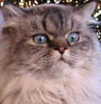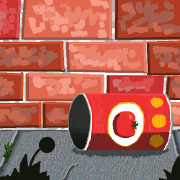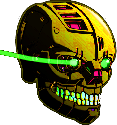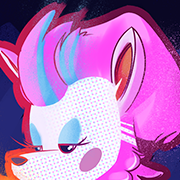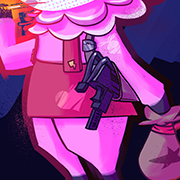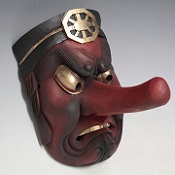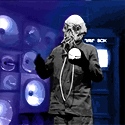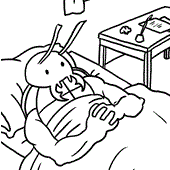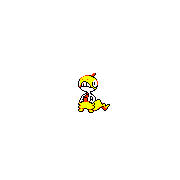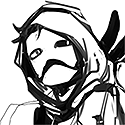|
To that end, starting out with something simple like a highly reflective metal ball with a single light that very clearly shows the change in shading can be useful. Practice with heavy/softer pencil marks to get the desired smoothness in the shading. Once you get comfortable with that, focus then on a harder subject with multiple changes in shadow/light (like the rabbit picture).
|
|
|
|

|
| # ? Jun 2, 2024 03:36 |
|
I looked through the thread but didn't see this mentioned, so forgive me if it was. What's the general opinion here about Skillshare? I like their "alternative to paid education" approach and a lot of the classes are really awesome. I got approached by them to teach a class on drawing backgrounds and perspective for comics and illustration, but that's going to be my very first interaction with the site. Has anyone here taken a Skillshare art class before, and if so, how did it work out for you?
|
|
|
|
I wasn't sure whether it was starting a new thread over but I wanted to find out something from you guys. It's a little along the psychological route - How do you get over bouts of anhedonia/loss of motivation with art? I've been drawing and painting my whole life but recently, although I KNOW I love what I do, all it does is bring me sadness and loss of motivation, and I can never figure out why. I'm fascinated with art - i could spend days and days reading about tone and value, colour theory, painters, concept art- but when it comes down to starting something big, not just something sketchy - I bail. I can't do it. (Or rather, I feel like I can't). I think it is most probably due to lack of confidence, that being "oh god, if I start this and spend ages on it then I know it'll be bad so there's no point in trying!" I'm finding it difficult to grow the thick skin needed to continue to develop as an artist and I know i am probably my own worst critic. It's hard to shake off being paranoid over something that might not work, or something people won't like. Instead of focusing on improvements i've made, I tend to focus on bad points or always imagine the outcome as so lovely there's no point doing anything. Or, the moment I finish something I have spent a lot of time on, the high wears off really quickly and I instantly start thinking "this loving sucks, I can do better!" tl;dr how do I stop being a neurotic, self-obsessed idiot and get on with making things and have any of you ever experienced being your own worst enemy/how did you fix it?
|
|
|
|
Juanita Xtreme posted:How do you get over bouts of anhedonia/loss of motivation with art? Honestly? There's unfortunately no One Weird Tip that you can use to psychologically motivate yourself to work on a piece of art. That moment where the muse firmly grasps you and pulls you headfirst into the river of creativity happens far too rarely to actively rely on it to allow you to get projects done. My personal recommendation is for you to read Get It Done When You're Depressed. Even if you don't have clinical depression, the strategies in the book are broadly applicable, especially if you find that your biggest block with your work isn't, "I don't have enough time for this," but is instead, "I think my work is rear end/I don't feel motivated." The essentials of it boil down to: 1) Because motivation is internal (a feeling obtained after you start work) rather than external the majority of the time, it's absolutely vital to set yourself a schedule of work. Ensure you're consistently working for a set period of time every day. Make it into such a habit that you no longer need to think about whether you "feel" like you're motivated to work on something or not. (As an example: I never wake up in the morning wondering if I "feel" like having a shower or not. If it's a work/school day, I have a shower, regardless of whatever I'm feeling.) Setting a consistent schedule and doing it regardless of whatever your brain is telling you will help to keep you going even on the bad days. 2) Learn to question everything negative your brain tells you. In psychological parlance, this is typically referred to as cognitive behavioural therapy (or CBT). If you're looking for a good resource for this, I almost always recommend The Feeling Good Handbook, which is a fantastic resource that teaches you all of the essentials for combating negative thinking. What you're essentially trying to do with it is to reorient your patterns of thinking in order to get rid of the lies your brain is telling you. (For example: When your brain tells you, "This loving sucks! I can do better!", you can use your training in CBT to question the truthfulness of this statement. Does it actually "loving suck?" What does that mean? Why is it important that you could "do better?" Does everything you do need to be a flawless masterpiece?) It should be noted, of course, that CBT is a skill like any other and does require some practice, but it helps immensely when you're confronted by negative, self-defeating thoughts. Vermain fucked around with this message at 00:00 on Jul 30, 2013 |
|
|
|
I don't know if it'll directly help you, but I personally got a lot less stressed out over drawing once I saw this graph:
|
|
|
|
pandaK posted:I don't know if it'll directly help you, but I personally got a lot less stressed out over drawing once I saw this graph: That's DNA you dumbass
|
|
|
|
s1ckly dW33b posted:That's DNA you dumbass It's all starting to make sense now...
|
|
|
|
s1ckly dW33b posted:That's DNA you dumbass Drawing is in my genes, what else can I say..
|
|
|
|
The book "Art and Fear" is another great read for diffusing self-sabotage.
|
|
|
|
Anybody have any tips on drawing regular geometric objects? By that I mean, drawing a ring or ball is harder for me that drawing a person, because even the tiniest flaw in proportion makes the whole thing horrifically off, but I can't draw them in "parts", so it's pretty much first go to get it right and I've gone through several sheets of paper trying to get a ring to actually look not melted.
|
|
|
|
Wapole Languray posted:Anybody have any tips on drawing regular geometric objects? By that I mean, drawing a ring or ball is harder for me that drawing a person, because even the tiniest flaw in proportion makes the whole thing horrifically off, but I can't draw them in "parts", so it's pretty much first go to get it right and I've gone through several sheets of paper trying to get a ring to actually look not melted. Timed gesture drawings. They aren't just for posing figures. My first drawing professor used to put three objects on the table, give us a piece of compressed charcoal, set his stopwatch to 15 seconds, and rotate them around each time until we all ran out of charcoal/fashioned it into a shiv and stabbed ourselves. In the case of still objects, that kind of fast drawing helps you develop a shorthand for describing proportions that you couldn't get laboring over it for hours and hours.
|
|
|
|
Wapole Languray posted:Anybody have any tips on drawing regular geometric objects? By that I mean, drawing a ring or ball is harder for me that drawing a person, because even the tiniest flaw in proportion makes the whole thing horrifically off, but I can't draw them in "parts", so it's pretty much first go to get it right and I've gone through several sheets of paper trying to get a ring to actually look not melted. And learn that "close enough" is often good enough. People aren't holding rulers and protractors up to your work to make sure your lines are ramrod straight and your circles are accurate to within a few decimals of pi.
|
|
|
|
Any recommendations on the best way to practice motor skills and observation? As a beginner, I'm still struggling to try and get lines to go the way I want them to. Is there anything I should be specifically focusing on (doing contour or gesture drawings, specific types of objects, etc.), or is it literally just "draw poo poo until it looks right"?
Vermain fucked around with this message at 02:37 on Aug 3, 2013 |
|
|
|
Vermain posted:Any recommendations on the best way to practice motor skills and observation? As a beginner, I'm still struggling to try and get lines to go the way I want them to. Is there anything I should be specifically focusing on (doing contour or gesture drawings, etc.), or is it literally just "draw poo poo until it looks right"? Draw a page full of lines. Straight ones, squiggly ones and zig-zagged ones. Using your whole arm, not just your wrist. Then using a fine tip pen try and go over each of those lines 10 times. Then do a page of circles, doing the same thing. Then try to draw the circles into a perspective grid and do the same. Go as slow as you need to and really try and hit the same lines. Don't push so hard that the pen makes groves in the paper that you can lazily follow. Use those as warm ups, then move to drawing from observation. Trying to find the underlying shapes of an object. Practice drawing the basic shapes that make up all objects (sphere, cube, pyramid and cylinders), try mashing those objects together in interesting and challenging ways. ..but it always goes back to drawing from observation. From life as often as possible, find a life drawing class, etc. That type of advice has been given several times over in the thread already. Try and have fun with it though, and fill up as many sketchbooks as possible.
|
|
|
|
Yeah, that's pretty good advice, but seeing as this is the Something Awful Creative Convention you can probably get by with streaming your favourite anime, pausing on an intense frame, holding a piece of poo poo sheet of a4 office printer paper against the screen and trace away with your sharpie set. Not to denigrate the vast majority of posters here who are interested in bettering the rendering of their western style DnD dragon scales or superhero armour sets, but anime is more culturally interesting as an outsider and so more artistic and you will gain self knowledge, which is what all art strives for (that and killing our fathers). So you should observe more of it. And that one's for free. (USER WAS PUT ON PROBATION FOR THIS POST)
|
|
|
|
Wapole Languray posted:Anybody have any tips on drawing regular geometric objects? By that I mean, drawing a ring or ball is harder for me that drawing a person, because even the tiniest flaw in proportion makes the whole thing horrifically off, but I can't draw them in "parts", so it's pretty much first go to get it right and I've gone through several sheets of paper trying to get a ring to actually look not melted. Some tips: 1. Draw construction lines (e.g. bounding boxes) around the thing first so that you have a reference point, especially for drawing in perspective. Remember the lines through the corners technique of finding the midpoint in perspective. 2. Turn your drawing 90 degrees after you draw it. When drawing circles free hand, people have a tendency to draw them too tall, so go for a different perspective. 3. If this geometric object is large in your drawing and flaws are unacceptable, use technical aids. Compasses, bendy rulers, trace over a printout.
|
|
|
|
Lenin Riefenstahl posted:Yeah, that's pretty good advice, but seeing as this is the Something Awful Creative Convention you can probably get by with streaming your favourite anime, pausing on an intense frame, holding a piece of poo poo sheet of a4 office printer paper against the screen and trace away with your sharpie set. Sharpies against your monitor? What are we, amateurs? Pencil only, then flip the paper over and ink it backwards. Flipping your traced art is like throwing down a peppermint bomb to evade scent-tracking dogs. FOOLPROOF.
|
|
|
|
Vermain posted:.... You are absolutely right. Since reading these posts I've managed to make myself DO more instead of THINK and it's created results.  Maybe not the results i've wanted but It's a drat sight better than lying in bed feeling crap about myself, and i already feel like i've improved a bit. I had a teacher who told me that obsession with perfection is good because it usually creates better work, but it can also be catastrophic because it can actually stop you from doing anything. I would say that rings true for me, and the next step is trying to actively question what my brain is doing instead of going with (usually negative) opinions. Maybe not the results i've wanted but It's a drat sight better than lying in bed feeling crap about myself, and i already feel like i've improved a bit. I had a teacher who told me that obsession with perfection is good because it usually creates better work, but it can also be catastrophic because it can actually stop you from doing anything. I would say that rings true for me, and the next step is trying to actively question what my brain is doing instead of going with (usually negative) opinions.mutata , this did help a lot, thank you  I always find when i finish something I think "gently caress, I coulda done this better. If I had just added highlights...etc." but by then I'm so tired out from finishing the project that I would rather just soldier on to the next one. I always find when i finish something I think "gently caress, I coulda done this better. If I had just added highlights...etc." but by then I'm so tired out from finishing the project that I would rather just soldier on to the next one.PandaK , This helped a lot too! downloaded onto my kindle so I can highlight it properly and bust out the quotes whenever I feel like poo poo. It pointed out a LOT of ways of thinking I have and why I worry about it. I feel as if most of this is caused because I am taking a course at University right now which deals in 'Fine Art' , but it is an extremely open and contemporary course so it brings in students from anywhere who do absolutely anything (performance, sculpture, painting, etc). I guess this goes against the self taught aspect but I always teach myself new things when i'm not in university (and in it, too) so I'd like to think that counts. All the advice people have given here has been so helpful and i've even written a few things down in my notebook so I can carry it around with me when i'm working  I had a really bad experience during my foundation year where my teachers had a very particular bias against certain styles and they were critical to the point of being rude, not constructive. Many days were spent worrying if I was "good enough", especially when applying to places with a portfolio, which was also terribly put together. I was rejected from a few places because they had a more modern style, but the place I am at now is really great because it seems to nurture every type of art from each student, and it was my first choice of art school. However I can't get the thoughts of my head that my art sucks, that i don't belong there, that there's no point applying for little jobs or exchange trips because they won't like the fact that I enjoy more traditional, 2D ways of working like painting, drawing, digital art, printmaking. Or that i'm more suited to another course such as illustration (which is what two teachers in foundation said to me ... after I had applied for Fine Art) , but for me I know that isn't the place i want to be. I want to be doing Fine Art; a broader course is definitely helping me think differently and to be open to more ideas and independent as an artist and enjoy trying different things, but I feel so frustrated that i'm not enjoying it because of stupid hang ups and not being able to be confident in myself. It's made me really confused in what i actually want to do because I'm stuck in 'please other people' mode, and i've definitely lost myself in the process, because I worry about what people could or might say, when I have no evidence that they will. I feel as i'm stuck in a "this is it, this is the end' mode, where there is nothing after my course and I will be lost, and my time will have run out. I want to enjoy myself again dagnabbit,  I worked drat hard to get here and I will be confident. I worked drat hard to get here and I will be confident. Anyway, sorry for the massive derail and life story. I made a few landscapes from Ansel Adams photographs just to get a feeling of how value works, which has been really fun.   
|
|
|
|
So I have dedicated myself to draw for 2 hours a day this month in the hope to build up a good habit. I have been having decent success with this site: http://artists.pixelovely.com/practice-tools/figure-drawing/ though I still have a long way to go on form. Here is a one of my better results: http://imgur.com/1HA28ii. My main question for the thread was while I feel I got some sense of form and proportion, I have no clue on value. This really saddens me, as beautifully done crosshatching is what first attracted to drawing. Does anyone have a good source or book that could help me get a better understand of how to properly crosshatch, in a way that illustrates the shape of a object?
|
|
|
|
Is that a pencil drawing? Using a single hardness of graphite will naturally limit your value range. Try getting one or two softer pencils, like a 4B and a 7B. Also, I'd recommend not trying to crosshatch when you're starting out. Establishing value and establishing value with crosshatching are different skills. Start out just using softer graphite and varying pressures. Draw really simple forms so you don't have to worry about the other aspects of rendering. Try putting an egg on your desk and illuminating it from different angles. If you really want to work on crosshatching, I'd use ink out of a technical or crowquill pen. This is a good book with some nice examples: http://www.amazon.com/Rendering-Pen...rawing+with+ink
|
|
|
|
I realized something after a few weeks away from art; this might be obvious for more experienced artists, but one good way to make textures in drawing is to pick a stroke pattern that accurately represents your sense of flow and smoothness. It's kind of hard to explain what I mean, but the grasses I drew in the foreground were made by repeating a stroke pattern that gave the spread and clump of wild grass.  I'm still working on this, but I felt like this is the kind of thing I would have liked to learn when I started out.
|
|
|
|
So I happened to bump into this thread while checking out this other part of the SA forums that I didn't even know was here a couple weeks ago. I'm a "directionless hack with no motivation". MODEDIT: gently caress NO . Is this stuff any good? What can I do with the skill I have? (USER WAS BANNED FOR THIS POST) Somebody fucked around with this message at 00:42 on Aug 13, 2013 |
|
|
|
Wooph posted:So I happened to bump into this thread while checking out this other part of the SA forums that I didn't even know was here a couple weeks ago. I'm a "directionless hack with no motivation". MODEDIT gently caress NO. Is this stuff any good? What can I do with the skill I have? So  REMOVED REMOVED was the first thing I clicked and I am totally skeeved out. And there are more. was the first thing I clicked and I am totally skeeved out. And there are more.What do you want people to say?! Yeah that's some pretty alright lighting on that naked anime child?? Edit: deleted my link, I felt too gross linking to it Somebody fucked around with this message at 00:43 on Aug 13, 2013 |
|
|
|
Wooph posted:So I happened to bump into this thread while checking out this other part of the SA forums that I didn't even know was here a couple weeks ago. I'm a "directionless hack with no motivation". MODEDIT: gently caress NO. Is this stuff any good? What can I do with the skill I have? One hell of a direction. One hell of a motivation. You'll fit right in. But work on your volumes and lighting. From the pics I somehow looked at for more than a few seconds, you're not lighting your bodies correctly, which makes it all look a bit like cutouts rather than real live anime girls of disturbingly uncertain ages. Also with the skills you have and are demonstrating I'm amazed you have been posting here for nearly three years without sharing this with us. Somebody fucked around with this message at 01:03 on Aug 13, 2013 |
|
|
|
Wooph posted:Is this stuff any good? What can I do with the skill I have? Hmmmm, well. Holy gently caress. What the poo poo possessed you to think linking that's a good idea? Okay. 1. Make a worksafe portfolio/directory to show people, and keep this separate from your fetish stuff. 2. Actually yeah, it is. Wonky anatomy and shading make me think you're trying to shoehorn anime features into a style better suited for realistic proportions, but I've seen people make money from way worse. Your scenery pics are actually pretty loving excellent. This thing for instance makes me wonder how you draw clouds. I've got a project that requires huge open skies and I'm loving struggling. 3. Fetish porn on hentaifoundry. There's a thread about this in ask/tell. 4. Make a goddamn worksafe portfolio to show people. Keep your fetish art way the gently caress separate. Worksafe! I mean worksafe enough that you could have a bunch of nuns look through it without getting weirded out. No nudes. No skimpy loving sundresses. No stumps or scars. Actually, no goddamn children at all ever. Wooph posted:MODEDIT: gently caress NO .  So glad I saw this earlier, the curiosity'd be killing me otherwise. nnnnghhhhgnnngh fucked around with this message at 01:20 on Aug 13, 2013 |
|
|
|
Sorry about freaking everyone out with that poo poo. Thanks for the criticism. The reason I feel directionless is because none of this poo poo is original. Most of the drawings are of characters in Katawa Shoujo. Scenery stuff is mine though. As for clouds, you should think of them as volumes that scatter light within them. Maybe look at some cloud photos on flickr or something and try to understand where the light is coming from, how thick the cloud is, how bright and what colour the rest of the sky is.
|
|
|
|
Diseased Dick Guy posted:Timed gesture drawings. They aren't just for posing figures. My first drawing professor used to put three objects on the table, give us a piece of compressed charcoal, set his stopwatch to 15 seconds, and rotate them around each time until we all ran out of charcoal/fashioned it into a shiv and stabbed ourselves. In the case of still objects, that kind of fast drawing helps you develop a shorthand for describing proportions that you couldn't get laboring over it for hours and hours. Going to add this to my morning warm ups regardless, just wanted to make sure I was focusing on the right parts to make the exercise most useful.
|
|
|
|
Giant Boy Detective posted:While post was a while ago, I'm trying this out now, and it's great and extremely challenging! What sort of other advice did he give along with the exercise? I'm trying to focus on getting the proportions of the objects and their spacial relationships down in just those 15 seconds, though entirely with contour lines and not going into shading or anything. And I don't think I've gotten the right line down the first time in any of the attempts thus far (and haven't gone back to try to fix the wrong lines given the brutal timeframe). Is this just something where if you do it enough (1,000+?) times it slowly develops your judgement and hand-eye coordination? Hmm, it was a while ago now so I'll try to remember as much as I can from the actual class. There was a huge emphasis on viewing the objects volumetrically. Contour lines alone are not a great way to approach this because they put a lot of pressure on you to get it perfect the first time, as you said. It takes a ton of practice to get a line right the first shot. Especially if the form is not very geometric. Thus we were encouraged to use the broad side of the charcoal to define the visual weight of forms. We still used contours, but were to apply them in a way that still conveyed weight. You don't have to be nearly as accurate to still hit your mark with this approach. It'll be a little messy, but the idea will be there. I was kind of skeptical of the entire method, because I was also worried about "shading" in a tiny time frame. However it did help because it made me practice seeing objects as volumes rather than the abstract shape a contour conveys. Remember that there's no such thing as an outline in real life. Contours are a shorthand your brain invents to show the boundaries of objects. They are lies, whereas shadows and volumes are more "true" to what you see. On top of the volumetric aspect, the exercise also helps you see the objects in a relationship with the entire picture. That's is more where the proportion aspect comes in. A visual aid is probably more important though. I have a few of these laying around, some of them are too messy to be helpful but:   I found these online but they're also great examples:   (source: http://smithart7a.blogspot.com/2011_01_01_archive.html) To answer your last question, yes you will absolutely get better at this if you just keep doing it over and over regardless of the way you approach it. Just make sure you're doing other exercises in between and constantly taking your process apart and analyzing it. Obviously, you won't improve as much if you just grind out a thousand drawings mindlessly.
|
|
|
|
Has anyone here tried Crit from Hell? Seems like a pretty cool idea.
|
|
|
|
That sounds awesome, but never heard of anyone try it.
|
|
|
|
Does anyone have tips for actually finishing drawings? I can't ever finish anything I start, because I feel like I screwed up somewhere and just scrap the whole drawing. Also, does anyone have good tutorials for drawing more complex things, like say a car or a machine or something, in perspective? Or hell, just any really good 2 or 3 point perspective tutorials?
|
|
|
|
soapydishwater posted:Also, does anyone have good tutorials for drawing more complex things, like say a car or a machine or something, in perspective? Or hell, just any really good 2 or 3 point perspective tutorials? ^loving BAM! General perspective AND cars. https://www.youtube.com/watch?v=l7eesQVXqOM https://www.youtube.com/watch?v=L5fJoE4x5Sc
|
|
|
|
soapydishwater posted:Does anyone have tips for actually finishing drawings? I can't ever finish anything I start, because I feel like I screwed up somewhere and just scrap the whole drawing. The reason you feel like that is simple: you're scared. I know this because I literally have had the exact same problem in the past. You don't want to try and finish it because, at the end of the day, it might not look as good as you want it to (which, in the case of a lot of people, is some unrealistic vision of "perfect"), and you have some vague, unnerving feeling that this would be terrible. What you've absolutely got to do is challenge this assumption. Why would it be bad if it doesn't look perfect? Does it have to be perfect? What will happen if I don't make a perfect picture? I think you'll find that a lot of your reluctance is simply negative self-talk that's buzzing away at the back of your brain and preventing you from actually finishing a picture. Check my post history in this thread if you want to know a little about how to talk back against those negative thoughts. As well, set a deadline for yourself. If you have infinite time for a project, it becomes insidiously easy to meander around on it, adjusting some of the shading, or adding in another flower, or whatever. A hard deadline will encourage you to focus on quickly and efficiently coming up with composition and filling in the relevant details and will help to distract you from the nervousness of making a complete drawing.
|
|
|
|
soapydishwater posted:Does anyone have tips for actually finishing drawings? I can't ever finish anything I start, because I feel like I screwed up somewhere and just scrap the whole drawing. Vermain is right, that is really just fear telling you to stop. I've never done a drawing that didn't cause me intense fear and anxiety at some point during its progress. I've cried through drawing assignments before. The way I power through it is to tell myself that this is serious. That my life depends on finishing this drawing. It sounds silly but the point is to officially take responsibility for myself and become an active participant in my artistic development. When you're in the middle of a drawing and you start to hear that nagging voice, there are a few ways you can handle it. Take a step back from the drawing. Like, literally take a step back. Take 5 steps back. Walk across the entire room. Look the the picture. Does it really look as bad as you thought it did? Probably not. This is one of the first things a great drawing teacher will teach any of their students. You won't be able to accurately assess your progress if you never put distance between yourself and the work. Have you ever had a sketchbook you thought was horrible until you looked back on it a year later? The same thing's at work there. Enough time passed that you were able to divorce yourself from the frustration you felt making the picture to see it for what it truly is. If you only spend time on a drawing hunched two inches over it, you're going to go insane and it's not going to look good. If stepping back isn't helping take a small break. Don't pick an activity that's going to engage you so much that have a chance to convince yourself it's not worth it to go back to the drawing. Just get a snack or something. I usually do more finished pieces on a small scale so sometimes I'll have a little sketch from my imagination going on the same page as the drawing just to get away but still keep up the flow. Also, don't forget too that you don't have to finish the entire thing in a day. Come back to it with a fresh mind tomorrow and you'll see all sorts of stuff you could do to make it better jumping out at you. Lastly, you don't have to fully render every drawing to photorealistic completion to learn from it. If you think you've learned everything that you can from a particular study then don't feel bad about stopping. Don't feel bad about stopping if you just get tired too. But don't stop just because you think it's crap. It's not. There are so many things that can stop you from drawing, but nothing has to be perfect. You just have to do it and that's it. Also check out this book, it'll help you understand where the nagging comes from and how to manage it.
|
|
|
|
I hope this isn't too much or too vague for one person to ask, but here I go: I'm looking into sketching again; it was something I did since I can remember picking up a pencil until I graduated from high school. At some point though I just stopped, and honestly I don't know why. Now it's like there is a mental block because I can't start before I just give up. I think my biggest problem is it feels directionless. An example of this is when I start on a sketch of a person I can't go further than a face because I have to have the face completely finished, even if I don't have a plan on what I'm doing with the rest of the body, much less than the rest of the sketch. My inspiration for sketching were comics and later in life, anime, seeing artistic styles and trying to replicate them. The problem though was not learning the process behind the designs but just trying to copy the end results. What I'm trying to learn are the necessary tools -- learning the human anatomy to better sketch human figures, using shapes to form the shape of the person (I've seen comic artists do this, forgive me for my vague description), etc. Any suggestions would be greatly appreciated. I am going the OP as well but the subjects detailed is somewhat overwhelming... BetterToRuleInHell fucked around with this message at 05:31 on Aug 20, 2013 |
|
|
|
Having the mindset that you're not trying to replicate a style is a good first step. Find a figure drawing class at an art studio, community college, meetup group, whatever. You can develop drawing skills on your own, but having immediate instructor feedback and being able to see how your peers tackle the same subject is priceless, especially if you're struggling to complete drawings.
|
|
|
|
Vermain, Diseased Dick Guy, thank you so much. That makes a lot of sense- I'll definitely try what you guys suggested. I have definitely had the fear/anxiety thing- often I can't get a particular part of my drawing correct, and I spend too much time on it. That gets my mind in overly critical mode, and I just get really frustrated because it never seems like I'm improving (even though I probably am) and I just throw the drawing away. Taking a step back to look at it or just walking away for a minute sounds like it would help a lot.
|
|
|
|
A good way to see your drawings fresh is to look at them in a mirror. Good for checking facial symmetry etc too.
|
|
|
|
BetterToRuleInHell posted:I think my biggest problem is it feels directionless. Here's my suggestion: do a very brief pre-plan of what you want to draw. I'm talking that you literally pencil in a stick figure in a pose and maybe do some rough scenery around the area. What you want to do is set down the initial "form" of what you're trying to draw before you start drawing in the face, body, etc. and then wondering what to do next. This is a part of drawing, as well: figuring out what you're going to draw (picturing it in your mind's eye) and then making it appear on the canvas. Don't be terrified of the fact that it's not exactly as you imagined it when you do draw it out; that art of translation is entirely a learned skill. It might help if you have some sort of goal you're working towards when it comes to the drawings (although you will still ultimately have to do a lot of sketching in order to focus and refine those skills). Have you considered trying to do your own comic? It might sound silly if you have no plans on showing it to people, but it gives form and structure to what is otherwise a series of disconnected sketches. Even if that isn't your goal, a comic can include a lot of diverse elements (composition, perspective, anatomy, etc.), and it can be a challenge to figure out how to fit them all together in a logical way. Plus, since you're not trying to paint a masterpiece, you don't have to worry about each panel coming out "perfectly" - you can just use it for practice and move on without spending ages dithering around with it.
|
|
|
|

|
| # ? Jun 2, 2024 03:36 |
|
Does anyone have tutorials for how to do hair? It seems like every time I try to draw hair/color/shade hair, I end up with anime-esque hair and I don't like it. I'm using SAI.
|
|
|


